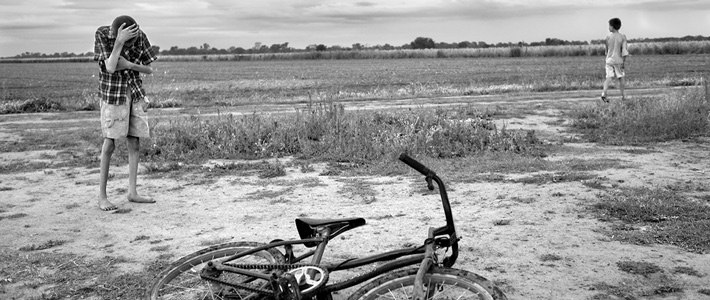
Exhibition documents terrible impacts of GMO agriculture in Argentina
"Stories from a wounded land" is a photo-essay by the journalist Alvaro Ybarra Zavala on the terrible impacts of GMO agriculture in Argentina. Some of the images are shocking.
Other pictures from the series are on Zavala's website.
He's just had an exhibition of these photographs at the International Festival of Photojournalism in Perpignan, France – bringing the issue to a global audience. There's a video here.
EXCERPT: Our work has been very little publicised but following publication in Argentina, we have been subjected to very direct pressure from the highest levels.
Monsanto is a monster
Caroline Stevan
Le Temps (France), 8 Sept 2014
http://www.letemps.ch/Page/Uuid/9d99349a-36ba-11e4-861b-f2a0f94a952e|0
English translation by Claire Robinson of GMWatch of French article
In Perpignan, Alvaro Ybarra Zavala questions the agri-food industry...
He himself said that the images are not spectacular. "I'm used to covering conflict, then I find this extremely boring job. I never photographed so many tomatoes. Red, green... " For nearly three years, Alvaro Ybarra Zavala Spanish documented the food industry. Questioning their excesses. Some of his black and white photographs, with neat and undeniably powerful composition, are at Perpignan, in the context of photojournalism festival Visa pour l'image. Grains of transgenic corn, a machine to spray insecticides, and many giant silos at the Monsanto plant in Rojas, Argentina - the largest in the industry. The daughter of a producer joyously celebrating her birthday. Then the sick and deformed children. The path is steep. Interview.
Question from Le Temps: Why this project?
Answer from Alvaro Ybarra Zavala: I started working on a particular case in Argentina, and I discovered that there were always more stories to tell. I understood that the issue was important and global. Accompanied by a journalist, a doctor and two lawyers, I threw myself into this vast investigation. The idea is not to create activism but only to launch a debate on how we want our food to be produced. This is crucial; everyone eats. Lawyers and a doctor are advising us because we want to make sure that we move forward. And on the opposing side, Monsanto can afford two hundred lawyers to fight us.
Q: Monsanto seems to be the big bad guy. Is it the only one?
A: It is not the only one, but the main one. It is a monster.
Q: What are the major problems?
A: Whether you are in India, Argentina or elsewhere, this type of agricultural production leads to problems of public health and the environment, human rights violations, political and economic tensions. This industry requires 4000-10,000 hectares to be profitable. Small local producers are sidelined and everywhere one finds the same multinationals. The small producers are having to sell their land or are forced to do so - especially in Brazil. And if they do not, their fields are surrounded with areas treated with pesticides, such as Roundup, which contaminate or destroy their harvests. In Argentina, the first generation of children is affected because their parents were exposed to these chemicals. Cases of miscarriages, diseases or malformations such as hydrocephalus are legion. I thought I'd have to search for them, but in every village of 600 inhabitants, there are at least 60-70 cases. The adults suffer from cancers and skin diseases. Contamination occurs through contact with the products, but also through food and water.
Q: One of the questions from your work is if the food industry is poisoning the world rather than feeding it. Do you have the answer?
A: Obviously, the big companies argue that they are the solution to world hunger. Activists argue that food crises prove otherwise. But the planet is indeed badly affected by this type of production.
Q: Are local people aware?
A: Yes, but these firms are giving them work. And cooperatives that manage health insurance, legal protection, etc. are very close to multinationals like Monsanto. Everything is done so that the system continues without being reported on.
Q: What about the authorities?
A: They also live off this business. Our work has been very little publicised but following publication in Argentina, we have been subjected to very direct pressure from the highest levels.
Q: What are the next steps for this work?
A: Malawi, Mozambique, India, and Europe and North America. Monsanto is in each of these countries, but again, our work focuses on the methods of food production and not on that particular company.









